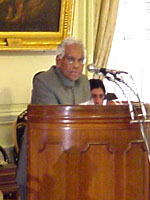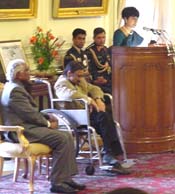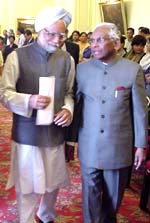 |
Shri. K R
Narayanan
President of India |
The President of India, His Excellency Shri. K R
Narayanan, was presented a copy of the Centre for Science and Environment’s latest
publication, Green Politics: Global Environmental Negotiations –1, at a function in
Rashtrapati Bhavan today. "This is a vital book," he said, adding that it would
go a long way in protecting India’s interest, and those of the third world, in the
international forum.
"CSE brought out the report because we realised that
not a single government agency, environmentalist or academician had a full picture of what
was happening at these global environmental negotiations," Anil Agarwal, CSE
director, said while presenting the contents of the report to the President and a
distinguished audience, including Dr Manmohan Singh.
 |
Anju Sharma
Coordinator of GEG Unit |
Agarwal pointed out that the negotiations showed several
dangerous trends from the point of view of developing countries. For instance, only
Northern concerns are taken on board, whether it is the hole in the ozone layer which was
found to cause cancer particularly to white skin, or the problems of persistent organic
pollutants (POPs) travelling to the Arctic.
Because these negotiations are writing rules and
regulations that will be the constitution for a future globalised world, it is important
that developing countries participate in a coordinated
 |
Shri. K R
Narayan & Dr Manmohan Singh. |
manner, and ensure that they do not compromise their
interests. So far, these negotiations have not been given the attention they deserve in
countries such as India.
For instance, the US realises that dealing with climate
change poses an enormous risk to their economies, and the climate negotiations are dealt
with by the US state department, and more than 200 people work on the issue. But even
though climate change is a bigger economic and environmental threat to India, only one
officer of the Indian government spends a third of his time working on the issue. Not once
had climate change been discussed by the cabinet, even though it is now clear that there
will be increased flooding in the already flood-prone North Eastern regions, and increased
droughts in the already drought-prone central parts of the country.
|

